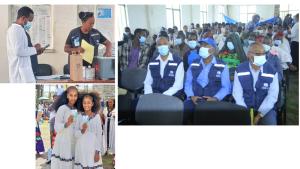An integrated COVID-19 and the Human Papillomavirus (HPV) vaccination campaign in Tigray completed
Ethiopia introduced Human Papillomavirus (HPV) vaccine for girls aged 14-year-old in 2018 and COVID-19 vaccine in March 2021. Since then, HPV vaccination has been provided as two doses to girls aged 14 years with a six-month interval and the COVID-19 vaccine to all people aged 12 years and above.
Tigray region was not able to participate in the nationwide integrated HPV and COVID-19 vaccination campaign which was conducted few months ago due to competing priorities. Tigray region launched similar integrated COVID-19 and HPV the campaign on 15th August 2023.
World Health Organization (WHO) Ethiopia in collaboration with the Tigray Regional Health Bureau (RHB), UNICEF, CDC, USAID, PSI, Girls Effect, Project Hope, and other partners supported the planning, implementation, and monitoring of this campaign. The integrated campaign was conducted in 76 woredas of 6 zones of the Tigray region (except Western zone and some inaccessible woredas) in collaboration with High-level officials, religious and community leaders.
Specific interventions included COVID-19 vaccination for people 12 years and above, HPV Vaccination for 14-year-old girls, Catch-up Immunization for the zero dose and unvaccinated children. Identification of women with Obstetric Fistula, uterine prolapses and children with clubfoot.
“This integrated service delivery contributes to saving the lives and reducing morbidity from a variety of preventable and treatable diseases and conditions, it is very essential to ensure equitable access by reaching the unreached community. The World Health Organization (WHO) Ethiopia will continue to support the Regional Health Bureau to strengthen its health system and improving the health of the community.” said Dr. Nonhlanhla Dlamini, WHO Ethiopia, Officer in Charge.
The community were mobilized through social media and printed materials mainly banners for the launch and to indicate vaccination posts. Sensitization sessions were held at the district level focusing on the youth groups as they significantly contribute to the targeted populations for both HPV and COVID-19 vaccination. About 1.1 million (1,150,363) doses of COVID-19 vaccine were allocated for this campaign this included Sinopharm, Johnson and Johnson, and Pfizer vaccine and 75,037 doses of HPV vaccine.
With support from USAID, WHO supported the operational cost for COVID-19 vaccination and provided technical support for the pre and intra campaign activities, including Training of Trainers and the cascaded training for health workers, Risk Communication and Community Engagement (RCCE) plan development, data management and supervision by deploying its National and regional based officers.
As the campaign was an integrated with many other lifesaving activities, the Interpersonal communication and the face-to-face- approach was utilized to identify and communicate the target audience. Initially, the school closure was reported as a concern that may affect the HPV vaccination implementation, but the RHB used the Ashenda festivity to reach target girls and successfully provided HPV vaccination, during out of school.
The campaign performance as of 23 August 2023, showed that 923 suspected obstetric fistula cases identified and referred, 463 club foot cases for under 2 years (203) and > 2 years (260) were identified and referred, 5,113 uterine prolapses cases of women identified and referred. Moreover, the campaign was used as an opportunity to reach zero dose the under immunized children and hence, 3520 zero dose children were identified and vaccinated, and 5,251 children were vaccinated: with Penta 3 (3991), MCV1 (3319) and MCV2 (1647).
